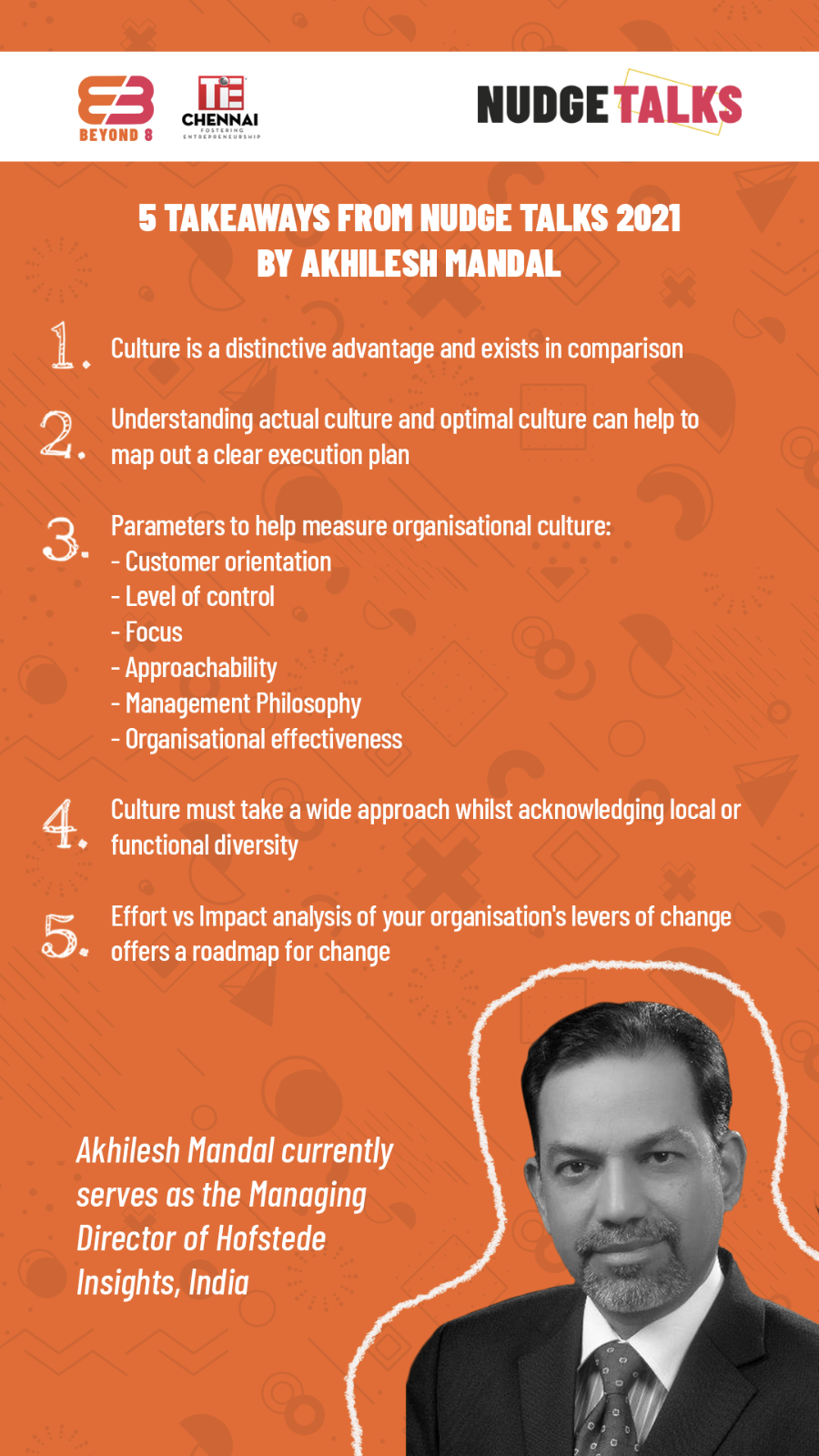5 truths about organizational culture: straight from the expert!
8 April 2021 — Written by Reyan Mishra

Organizational culture is quickly rising to the top of the priority list for business across the board, more so for small and medium ones that are gaining their footholds. As a matter of truth, almost every aspect of life is impacted by culture in one way or the other. To capture its essence culture is a mammoth feat in itself, what with its multiple dimensions and defining elements. However, in association with TiE Chennai, we have attempted to do just that with Nudge Talks 2021.
In the first session of Nudge Talks, veteran academician Professor Neharika Vohra, Vice Chancellor at Delhi Skill & Entrepreneurship University, engaged over 60 participants with a masterclass on culture and its impact on life and productivity. In this post, we delve into the workshop on creating and sustaining a healthy organizational culture, hosted by Akhilesh Mandal, Managing Director of Hofstede Insights India. He has been passionate about building high performance organizations by aligning Business Strategy, Organization Culture and Leaders’ behaviours. He brings a unique mix of Business and People insights to the business metrics centered advisory services to his clients.

Here are the top five areas to be sure of as you create and sustain a culture you want for your organization:
How do we define organizational culture?
Mr. Mandal goes back to a definition from his idol and popular social psychologist Geert Hofstede: A culture is the collective programming of the human mind that distinguishes one group from another group. On similar lines, organizational culture is the way in which members of an organization relate to each other, their work and outside world in comparison to other organizations. Although each organization has a culture of some kind, not all of them are useful in implementing an effective organizational strategy.
How do diverse groups of people impact organizational culture?
According to Akhilesh Mandal, there are three features of organizational culture that everybody sort of takes for granted:
- Culture is a group phenomenon, not an individual system. In other words, you need a group of people to form a culture. This is what makes culture an asset that benefits all.
- The group could be anything - an organization, a mission (like national culture), a function, or a team within an organization.
- Different departments in an organization have subcultures that is to say that there are cultural commonalities across the organization. However, since the work of every department is different, they may also have a different way to relate with people and form relationships. That would be subculture, not culture.
How do you assess if your organizational culture is working?
People who are a part of a certain culture may not see the merits or problems associated with it. However, a new entrant sees it pretty vividly- all the flaws and advantages. Since he/she is new to the organization coming from somewhere else, they can clearly state what the difference is and how the current organizational culture is above or below others. Mr. Mandal states that it often takes a newcomer to tell you what is right and what may not be right.
What are the different ways in which organizational culture manifests itself?
Perceived Culture This is what the insiders think of their own organizational culture. They may think it’s rather encouraging, innovative, or probably poor. That fact is that perceived culture may or may not be true. Again, a newcomer can be of help to form a better image of a culture.
Paradise Culture Paradise culture is what people love to have. For example, in an organization, people may love to have only a 5-hour workday. However, that may not necessarily be the right method to achieve the organizational goals.
Actual Culture The unbiased and correct measure of your organizational culture is actual or current culture. This is where one organization stands in terms of values, ethics, style, and work.
Optimal Culture The culture that you desire to have is the optimal culture. It is an optimal culture. almost like paradise culture. However, the former may be more practical than the latter.
Do we need to make a shift in order to be in sync with national culture?
Answering a participant who asked this question, Mr. Mandal explained that there is no need to shift one’s culture drastically to suit national culture. But you need to be aware that if you are an Indian company that wants to go global, your design processes should take into consideration the nuances of culture. “I have seen many Indian companies that believe they are MNCs, but employees working in them who are from other countries say that it is just an Indian company. It happens because though they declare themselves as an MNC, they are not sensitive to the values of other countries. So yes, your behavior and processes have got to be more sensitive.”, he elaborated.
We hope you could take away valuable and practical perspectives on organizational culture to apply in your own business. Join us next time for a Fireside Chat with Mr. Rajendran Dandapani [insert title and event details].
For updates on upcoming Nudge Talks, please visit the event page and register. You can also follow Beyond 8 on Facebook and Instagram or simply connect with us on the website.